KUALA LUMPUR: The government is planning to amend the Registration of Births and Deaths Ordinance (Sabah Cap.123) to update and align its provisions to the National Registration Department’s (JPN) current administrative system, said Deputy Home Minister Datuk Seri Dr Shamsul Anuar Nasarah.
He said the proposed amendments have been presented to the Sabah State Attorney General, who has no objections to the matter.
“In summary, there are 35 sections to be amended, 48 new sections to be included, 26 sections to remain unchanged, and 13 sections or subsections to be repealed.
“The constitutional amendments related to citizenship, approved on Oct 17, also require Ordinance CAP. 123 to be reviewed and amended for relevant matters,” he said during a Special Chamber session in the Dewan Rakyat today.
He was responding to a supplementary question from Isnaraissah Munirah Majilis (Warisan-Kota Belud) on whether the government plans to amend Ordinance CAP.123 to address citizenship issues in Sabah and the justification for this move.
Shamsul Anuar said that since its enforcement on March 1, 1951, the ordinance, declared a federalised Sabah law, has never been amended, rendering some of its provisions irrelevant to JPN’s current administrative system.
Earlier, Isnaraissah Munirah, in her motion concerning undocumented migrants, citizenship, and non-citizenship issues in Sabah, sought an explanation from the Ministry of Home Affairs on why no responses were provided for the citizenship applications in Sabah between 1970 and 1990.
She also asked about the federal government’s measures to expedite late MyKad registration for Sabahans in remote areas and whether discussions with the state government have been held on establishing a fast-track lane for this purpose.
Shamsul Anuar explained that data on citizenship applications in Sabah from 1970 to 1990 could not be immediately retrieved due to differences in data collection methods at the time.
However, he said KDN has improved its citizenship data management system to ensure that current citizenship application records are documented transparently and systematically.
Regarding the late MyKad registrations, he said JPN has taken proactive measures to facilitate the late identity card registration (DLKP) cases, with DLKP applications now accepted at all JPN offices nationwide and through the ‘Menyemai Kasih Rakyat’ (MEKAR) programme.
At the same time, Shamsul Anuar said claims that the Sabah Foreigner Card was intended to grant citizenship to foreigners were unfounded. Instead, the card aims to manage the presence of undocumented migrants in Sabah and enable better identification and monitoring of this group.









